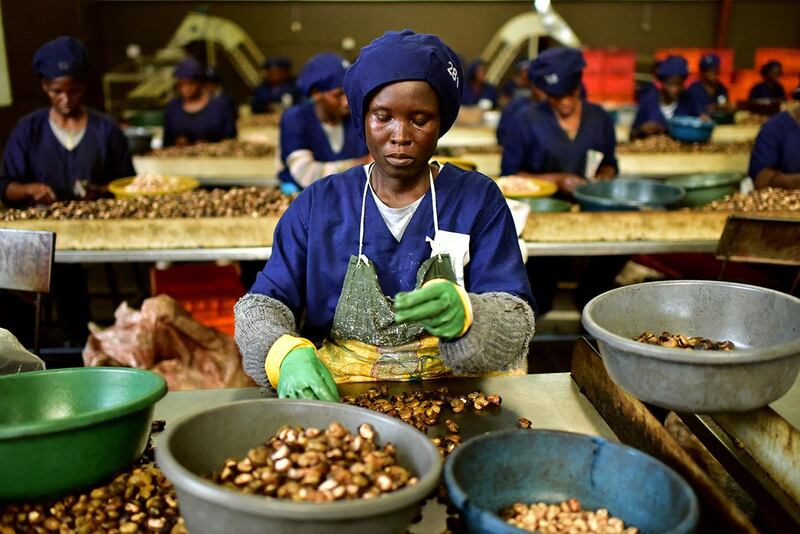Africa grows most of the world’s raw cashews but only processes a fraction of them, missing out on opportunities offered by rising global demand, according to a report by the United Nations Conference on Trade and Development.
The global market for cashews is booming, but the African countries growing more than half the world's supply aren't cashing in due to their lack of processing industries, the UNCTAD report titled Commodities at a Glance: Special issue on cashew nuts said.
“Countries that grow cashews but don’t process them at a significant scale retain only a small share of the value created as the nut travels from the farm to store,” Miho Shirotori, who leads UNCTAD’s work on trade negotiations and commercial diplomacy, said. “African farmers, exporters and workers are missing out on a wealth of opportunities.”
About 20 million jobs are at risk in Africa as the continent's economies were projected to shrink in 2020 due to the impact of the coronavirus pandemic, according an African Union study. Up to 15 per cent of foreign direct investment could disappear, the study found.
Between 2000 and 2018, world trade in raw cashew nuts more than doubled to 2.1 billion kilograms, and African producers – led by Côte d’Ivoire – accounted for almost two-thirds of the growth. But the continent’s farmers and exporters receive only a fraction of the final retail price, the report said.
About 90 per cent of the raw cashew nuts traded in the global market are grown in western and eastern African nations. After Côte d’Ivoire, the leading cashew producers are Tanzania, Nigeria, Benin, Guinea-Bissau, Mozambique and Ghana, according to UNCTAD.
However, less than 15 per cent of the continent’s nuts are deshelled on African soil. The rest is exported mainly to Asia, where 85 per cent of the world’s cashews are deshelled, the report said. Two Asian countries – India and Vietnam – accounted for about 98 per cent of the world’s raw cashew imports between 2014 and 2018.
Even more value is added in Europe and North America, where 60 per cent of traded kernels are roasted, salted, packaged and consumed as a snack or an ingredient in a drink or other product UNCTAD said.
In 2018, the export price of cashew kernels from India to the European Union was about 3.5 times higher than what was paid to cashew farmers in Côte d’Ivoire – a 250 per cent difference in price, as per the report. And after secondary processing in the EU, the price of the cashew kernels was about 2.5 times higher than when exported from India – and about 8.5 times more than when they left the farm in Côte d’Ivoire.
“This shows the potential for value creation in African cashew-growing countries, 14 of which are classified as ‘least developed’,” Ms Shirotori said. “And value creation can lead to better wages for workers and more money for the local economy.”
The UNCTAD report highlights the potential for cashews to contribute to the UN Sustainable Development Goals, specifically on poverty reduction.
“Since production typically takes place on smallholdings in rural areas, there is a direct link between value addition in the cashew sector and the achievement of poverty reduction,” the report said, highlighting that cashews are a source of income for an estimated 3 million smallholder farmers in Africa.
The report said that all 46 countries that produce cashews “on a significant scale” are developing economies, 18 of which are classified as “least developed countries”.
A dozen of the other countries growing the nut are Asian (four are LDCs) – accounting for 43 per cent of global production – and 14 are in the Latin American and the Caribbean region, which produces 5 per cent of the world’s supply, the report found.
Meanwhile, global consumers’ growing preference for healthier snacks and their increased preference for food products that are environmentally friendly and ethically sourced present opportunities for African processors, the report said.
“The traceability, transparency and sustainability of food supply chains is becoming increasingly important for consumers and suppliers,” the report said, highlighting that this could benefit African processors who source their nuts locally rather than through long supply chains.
The UNCTAD report also called for a policy environment in Africa “that enables cashew processors to operate with competitive transformation costs and facilitates access to the main export markets”.
Some policies that would strengthen African countries’ productive capacities include ensuring farmers have access to quality seedlings and technological know-how, increasing training for farmers on entrepreneurship and farm management, supporting research that helps identify agricultural practices and technologies that work best in local environmental conditions and improving rural infrastructure, among others, the report’s authors recommended.








